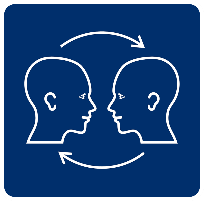Your feedback or complaint may be about:
2.1 The Board of Trustees: Trustees are responsible for overseeing the day-to-day running of Communication Matters, and ensuring it meet its aims and objectives. Trustees’ activities include organising the annual International AAC Conference and Study Days and vetting and administering grant applications.
Trustees follow Best Practice guidelines in all their activities for the charity. These include BP02: Being a Trustee; BP12: Trustee Code of Conduct; and BP14: Trustee Conflict of Interest. These documents can be downloaded from the Communication Matters website: communicationmatters.org.uk/about-us/trustees-and-staff
2.2 Staff: The Communication Matters Charity Manager and Administrator handle the day-to-day running of the organisation, such as membership renewals, conference registration, organising events, communications, and book-keeping.
2.3 Organisational, Corporate and Institutional Associate Members of Communication Matters: These members include businesses selling AAC equipment or services and not-for-profit organisations involved in AAC.
When joining Communication Matters these organisations agree to follow the Communication Matters Code of Conduct. It is not a legal document but provides guidance on conduct when attending a Communication Matters event or when using the name Communication Matters to endorse the member’s work. The Code of Conduct for Organisational, Corporate and Institutional Associate Members of Communication Matters can be found at: communicationmatters.org.uk/about-us/join-us/
Commercial and corporate organisations are regulated by the British Healthcare Trades Association (BHTA). The BHTA have their own Code of Practice and complaints procedure.
If your complaint refers to an organisational member it may be appropriate for Communication Matters to refer you onto the BHTA: bhta.com
2.4 Individual Associate Members of Communication Matters: These members include AAC users, family members and professionals who have an interest in AAC.
Professional members will be regulated by their own professional regulatory body. If your complaint refers to a professional member it may be appropriate for Communication Matters to refer you onto the relevant Professional Regulatory Body.
For healthcare professionals: hcpc-uk.org
For education professionals in:
– England: www.gtce.org.uk
– Scotland: www.gtcs.org.uk
– Wales: www.ewc.wales/site/index.php/en/
– Northern Ireland: www.gtcni.org.uk
2.5 Communication Matters will only handle complaints that are directly related to a Communication Matters activity or event. If your complaint is about the professional conduct of an associate member you will be directed to the appropriate regulatory body. If the complaint is about a private individual who is not covered by any of the above, the complainant should be advised that their only recourse is through the statutory legal process.






